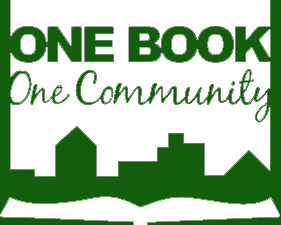
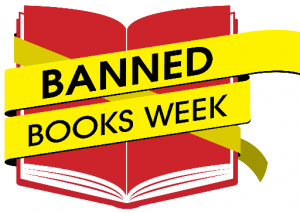 The One Book, One Community program began in the Fall of 2002. Over the last 16 years, four of the book selections have been banned or challenged in the United States. The information below is garnered from the annual bibliographies written by Robert P. Doyle, in conjunction with the American Library Association.
The One Book, One Community program began in the Fall of 2002. Over the last 16 years, four of the book selections have been banned or challenged in the United States. The information below is garnered from the annual bibliographies written by Robert P. Doyle, in conjunction with the American Library Association.
2002 OBOC Book "Fahrenheit 451" by Ray Bradbury
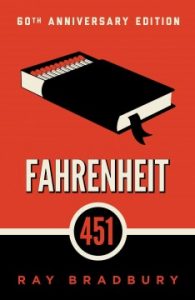
2006
Challenged at the Conroe, Tex. Independent School District because of the following "discussion of being drunk, smoking cigarettes, violence, 'dirty talk,' references to the Bible, and using God's name in vain." The novel went against the complainants' "religious beliefs."
2005 OBOC Book "The Kite Runner" by Khaled Hosseini
2008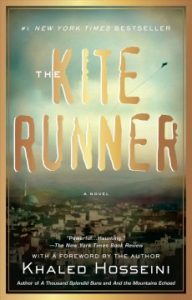 * Challenged as appropriate study in tenth-grade honors English class at Freedom High School in Morganton, N.C. because the novel depicts a sodomy rape in graphic detail and uses vulgar language.
* Challenged as appropriate study in tenth-grade honors English class at Freedom High School in Morganton, N.C. because the novel depicts a sodomy rape in graphic detail and uses vulgar language.
* Retained in the Jackson County School District, Marianna, Fla. after being removed from the required reading list for one class. The school board voted to retain the book in the library by a vote of five to two.
* Removed from the reading list at Centennial High School in Champaign, Ill. due to objections from a parent whose child was assigned the book for summer reading.
* Challenged in Burke County schools in Morgantown, N.C. by parents concerned about the violence and sexual situations portrayed in the book.
2011
Challenged, but retained as part of Senior Advanced Placement English at the Valley
View High School in Jonesboro, Ark. The issue arose after two patrons disapproved of the novel because of a scene depicting male-on-male rape, sexual innuendo, and vulgar language, as well as religious content throughout the book.
2012
Challenged as optional reading in the tenth-grade honors class at Troy, Pa. Area Schools because the novel depicts a sodomy rape in graphic detail and uses vulgar language.
2014
Challenged, but retained as part of the Waukesha, Wis., West High School curriculum despite claims the book “desensitizes students to violence.” The New York Times best seller is set against a backdrop of tumultuous events, from the fall of Afghanistan’s monarchy through the Soviet military intervention, the exodus of refugees to Pakistan and the United States, and the rise of the Taliban regime. A number of adaptations were created following publication, including several stage performances and a graphic novel. The film of the same name was nominated for the Golden Globe Award for Best Foreign Language Film in 2007.
2015
Suspended, but later reinstated as approved reading at the Buncombe County, N.C. schools. The complainant, a self-described “conservative government watchdog,” cited state law requiring local boards of education to include “character education” in the curriculum. She also said schools must teach sex education from an abstinence-only perspective. The book is used in tenth-grade honors English classes and parents can request an alternative reading assignment for the child. The New York Times bestseller is set against a backdrop of tumultuous events, from the fall of Afghanistan’s monarchy through the Soviet military intervention, the exodus of refugees to Pakistan and the United States, and the rise of the Taliban regime. A number of adaptations were created following publication, including several stage performances and a graphic novel. The film of the same name was nominated for the Golden Globe Award for Best Foreign Language Film in 2007.
2006 OBOC Book "The Glass Castle" by Jeannette Walls
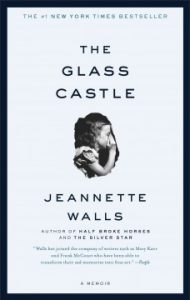
2009
Challenged at the William S. Hart Union High School District in Saugus, Calif. as required summer reading for the honors English program. The 2005 memoir chronicles the author’s harsh childhood and family life and includes profanity, criticisms of Christianity, and accounts of sexual abuse and prostitution. Students have the option of alternative assignments that still meet objectives and teaching goals.
2012
Challenged, but retained as part of the tenth-grade English curriculum in the Sade-Central City High School classrooms in Cairnbrook, Pa. The 2005 best-selling memoir in which Walls describes her hardscrabble upbringing includes sexual assault, casual profanity, drunkenness, seeing the family cat pitched from a moving car, and having to drink ditch water. Even critics of the graphic book praise its theme — overcoming adversity.
2012
Removed, but later returned as an assigned reading for ninth-grade honors English in the Traverse City, Mich. West Senior High School. The 2005 best-selling memoir recounts the author’s experience growing up in a dysfunctional family with an alcoholic father and a mother who suffered from mental illness. It includes explicit language and references to child molestation, adolescent sexual exploits, and violence.
2013
Challenged at the McPherson, Kans. High School pre-AP English freshman class. A school
committee unanimously determined the book was appropriately placed in the curriculum noting the district’s opt-out policy, which allows all families to opt their children out of any assignment, and ask for an alternate one. The committee made a series of recommendations to the superintendent, who sent a letter to the parents informing them of these recommendations and asking if they desired to appeal the committee’s decision. No one appealed the decision.
2014/2015
Suspended in 2014 from the Highland Park, Tex., Independent School District’s approved book list by the school superintendent. The decision sparked a backlash and drew national attention. The superintendent then reinstated the book. In February 2015, the school district trustees approved policy changes on how the district selects books and handles parents’ objections. The challenged memoir is about growing up in poverty with a father who spent his money on alcohol and a mother who became homeless.
2015
Suspended at the Ambridge, Pa. High School because the book is “racist and sexually explicit.” The challenged memoir is about growing up in poverty with a father who spent his money on alcohol and a mother who became homeless. Published in 2005, the memoir spent a total of 261 weeks on the New York Times bestseller list and is now under development as a film by Paramount. By late 2007, The Glass Castle had sold over 2.7 million copies, had been translated into 22 languages, and received the Christopher Award, the American Library Association’s Alex Award (2006), and the Books for Better Living Award.
2011 OBOC Book "Extremely Loud and Incredibly Close" by Jonathan Safran Foer
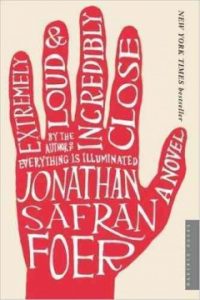
2010
Challenged in the Richland, Wash. School District. Used in a tenth-grade honors language arts class at Hanford High, the book tells the story of Oskar Schell, a young boy whose father died in the 9/11 World Trade Center attacks. The book contains profanity, sex, and descriptions of violence.
2015
Removed from the Mattoon, Ill. High School curriculum because of “its use of lewd and possibly offensive materials.” The novel’s narrator is a nine-year-old boy, Oskar Schell, who lost his father in the 9/11 attack on the World Trade Center, and is convinced that his dad left a final message for him somewhere in the city. The book was named to the New York Public Library’s “Books to Remember” list and to the American Library Association’s Notable Books for Adults (2006). A film adaptation of the novel was released on January 20, 2012, starring Tom Hanks and Sandra Bullock.


Add a comment to: Banned/Challenged One Book, One Community Books